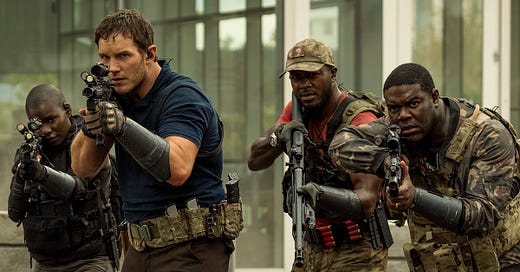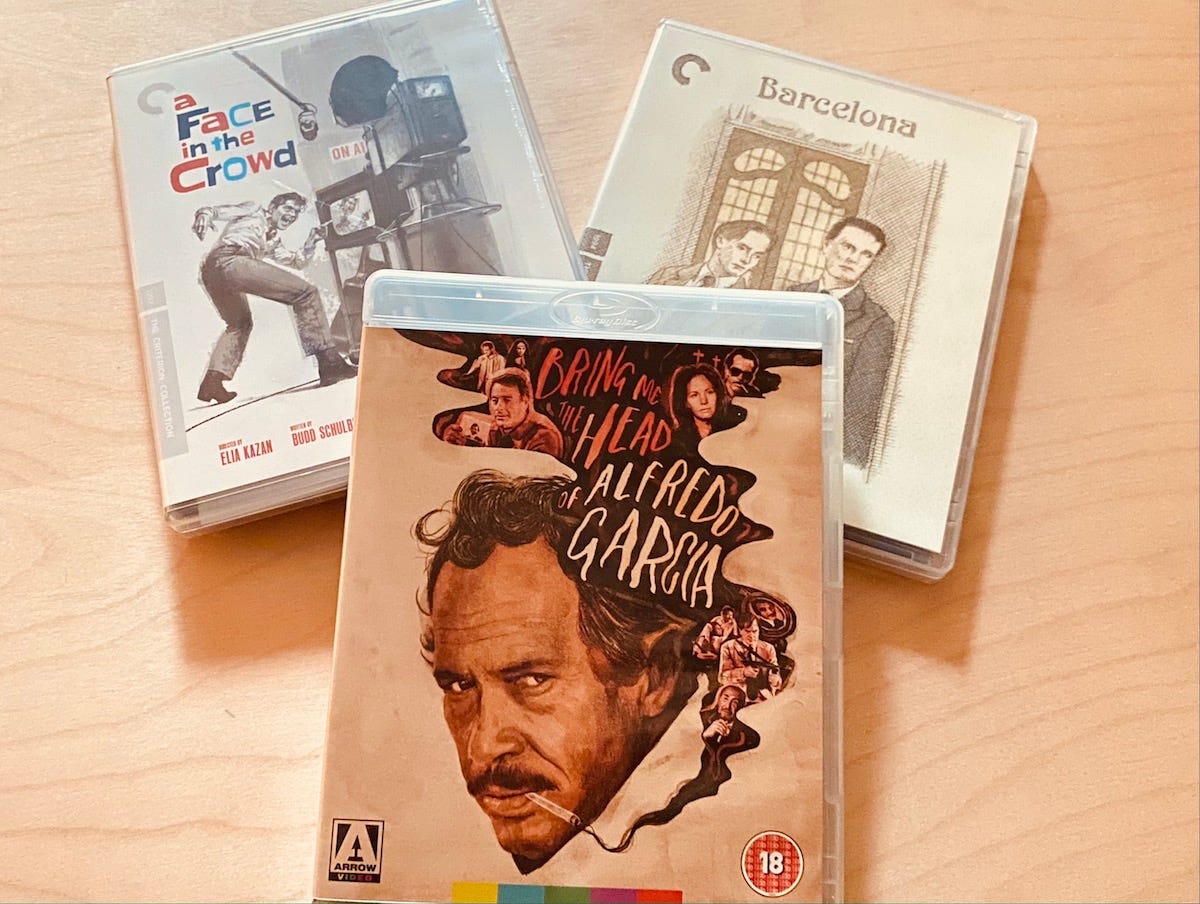
‘The Tomorrow War’ Review
Plus: Good things cost money! And a revolutionary recommendation.
I was really excited to talk to James White, the head of restoration at Arrow Films, for The Bulwark Goes to Hollywood this week. In part because I simply don’t know a ton about film restoration, and James walked me through all the ins and outs and what-have-yous that I’d long been curious about. In part because it’s always interesting to hear experts talk about their areas of expertise, regardless of the topic. And in part because I’m a fan of Arrow Films, which is something like the U.K. equivalent of the Criterion Collection (though they have a U.S. distribution arm now that’s putting out lots of stuff for American audiences).
But what I want to highlight here is something that White and I touched on only briefly, and that’s the cost of a transfer and a restoration of a film. We didn’t talk about any specific titles because I didn’t want to put him on the spot, but when you’re dealing with a process that essentially involves photographing every frame of a film in high resolution in order to make a digital file for it and then touching up every one of those files to remove dirt, tears, scratches, etc., it’s not cheap.
“Any label like us is going to work with dedicated labs that give preferential rates to allow us to do what we want to do within certain economic barriers,” White said. But even with that, you’re looking at a cost of anywhere from the low to mid five figures to get a film up to snuff, and that’s before the cost paid to the distributors who actually own the films, or the cost of actually physically making the discs and the packaging, or the cost of commissioning new artwork, new extras, new commentary tracks, new essays for the interior.
All of which is to say that when you see a Blu-ray from a boutique studio like Arrow (or Criterion, or Scream Factory, or anyone else) and you wonder why this costs so much more than your standard disc from a major studio in the bargain bins at Walmart or heavily discounted on Amazon or whatever, just consider how much extra work goes into making it look as good as it can possibly look for you.
Times are always tight, so I understand the annoyance. If you want to save a little, wait for sales (Arrow has one going on right now; Barnes and Noble’s 50 percent off Criterion sale started today). But don’t grouse about the expense. Good things cost more money. You’re paying for the quality. Enjoy it.
Good sites also cost money! You’ll have noticed The Bulwark doesn’t rely on ads to generate revenue, but we do rely on subscribers. If you like what you’ve been reading here and listening to elsewhere, please consider picking up a membership. It’s $10 a month or $100 a year and you’ll help keep this newsletter sustainable. Surely you want to keep me knee-deep in Arrow Blu-rays, don’t you?
‘The Tomorrow War’ (Prime Video)
At minute 100 or so, The Tomorrow War is, basically, over. The protagonist has suffered a sacrifice, learned a valuable lesson about himself, and procured what is needed to save the world. Understanding this—feeling it really quite deeply in my bones—I said aloud to myself “how the fuck are there 40 minutes left in this movie?”
Movie bloat is real and exasperating (you sit through 140 minutes of F9) and it felt for a moment as though The Tomorrow War was yet another example of this phenomenon. And yet, dear reader, I have to say: The Tomorrow War earned that last 40 minutes. Perhaps I’m simply a sucker for Dad Movies; this flick certainly hits all the sweet-and-sour centers of the brain such flicks activate. Maybe it was just good to spend more time with J.K. Simmons, whose brief appearance early on felt like a tease. Whatever the reason, my annoyance evaporated and I sat there, rapt, curious to see what the film had left to say.
The Tomorrow War’s concept—a few decades in the future, the last remaining humans send soldiers back through time to recruit draftees to fight off an alien invasion that has put humanity on the brink of extinction—is high. Its star wattage—Chris Pratt currently anchors two billion-dollar franchises: Guardians of the Galaxy and Jurassic World—is also high. But the thematic core of the film is relatively low key, entirely relatable. It’s a movie about dads trying to find their place in the world, understanding that their greatest responsibility is to their kids, to their future.
After Dan Forester (Pratt) is drafted into the Tomorrow War, he’s faced with a choice. Either go to his absentee father, James (Simmons), in the hopes that the ne’er-do-well electrical-engineer-cum-survivalist can detach the device from his arm that will send Dan hurtling through space-time, or say goodbye to his family and do his seven-day tour.
Seven days? That doesn’t seem so bad, right? Well, the casualty rate on these deployments nears 70 percent, so, yeah, kind of bad. Not too pleasant. And those who come back from doing battle with the White Spikes are often bereft of limbs, left little more than gibbering idiots unable to deal with the world. The recruits aren’t aided much by their training, which is to say, they don’t receive any. (Forester, fortunately, comes well equipped as a veteran who doesn’t need another round of basic.)
Indeed, they don’t even get uniforms: They just go off to battle wearing what they wore to the recruitment center. T-shirt and jeans or suit and half-done tie or tracksuit, it doesn’t matter. The costuming choice here is intriguing, giving the band of civilians with automatic weapons a truly ragtag feel, as if they’re the remnants of a post-apocalyptic band trying to make a go of it.
This is, of course, a big-budget action movie, and I’d be remiss if I didn’t mention that it’s a shame we’ll only get to see this on our couches and our TVs. Yes, there’s something to be said for convenience. But there’s also something to be said for seeing a blockbuster, battle-oriented action movie on an enormous screen with ear-punishing speakers. I would’ve liked to have felt the bombing runs on Miami in addition to having seen them. When Romeo Command (Yvonne Strahovski) and Forester are scrambling to survive a massive assault by the White Spikes on their ocean-based military outpost, it would’ve been nice for the beasties to look a bit bigger than a colony of ants.
There are two ideas at the heart of this picture. The first is a not terribly subtle metaphor for climate change that will undoubtedly rankle many conservative viewers, though it’s just the latest in a long line: from Soylent Green to the Mad Max movies to The Day After Tomorrow, eco-apocalypse is always just around the corner. To be honest, I was mostly amused to see a movie where the evils created by global warming are solved with shotguns and poison darts while the U.N. is explicitly denounced as a useless bureaucracy that would fiddle as the world burned, forcing private actors to eschew government aid to better the planet. But that’s just me.
And the second, as I mentioned, is about the debts father owe their children, a theme that wraps neatly into the first. Yes, the world we leave our children is important. But so is the time we spend with them, the way we shape them, the effort we make to better their lives. The Tomorrow War is, at heart, a movie about time and what we do with it. Fathers must learn to spend it well.
Want to convince someone to watch The Tomorrow War? Share this newsletter with them! It’s the friendly thing to do.
Assigned Viewing: ‘Salvador’ (HBO Max)
I’m assigning this because it’s leaving HBO Max at the end of the month and it’s not readily available on Blu-ray in the United States. Oliver Stone released two movies in 1986. One was Platoon, and that Vietnam-era semi-autobiographical film wound up winning a bunch of Oscars. It’s fine.
The other, which is great, was Salvador, which stars James Woods as an American photojournalist uncovering atrocities in the Latin American nation that are taking place with the tacit approval of the American government. This is a slightly more restrained Oliver Stone than the guy who would go on to make JFK and Natural Born Killers, both in terms of style (in particular, the editing) and content. While it is absolutely a howl of outrage of the sort Stone is best known for, it also closes with an admirably dyspeptic look at the very guerillas the film has nominally been championing. Revolutions can be ugly things,* and we shouldn’t close our eyes to atrocities simply because we like those committing them.
*Excluding the American Revolution, of course. George Washington bathing in the blood of America’s oppressors was pure as the driven snow, so you can enjoy your burgers this weekend in peace. Happy Independence Day!














There is a really good chance that in an alternate reality I would have gone and seen The Tomorrow War in the theater. I would have snuck away from work on a Friday afternoon or something and had a good time. Having to make time at home to watch it on the couch somehow feels more daunting, and honestly, less likely. I dunno...that's just me. I mean, I saw Gemini Man and Bad Boys For Life in theater.